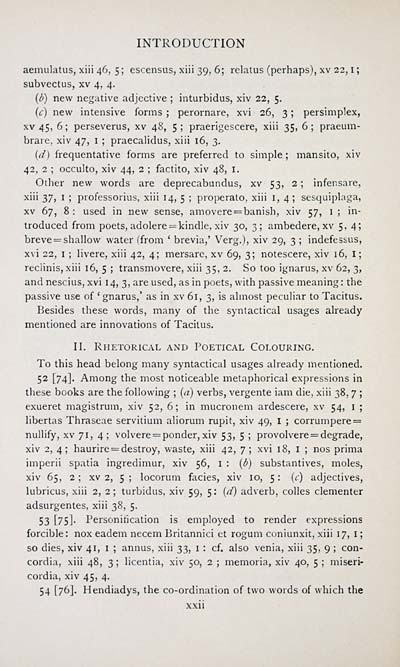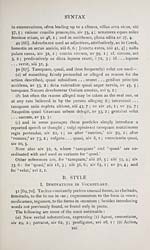Download files
Complete book:
Individual page:
Thumbnail gallery: Grid view | List view

INTRODUCTION
aeimilatus, xiii 46, 5 ; escensus, xiii 39, 6; relatus (perhaps), xv 22, 1 ;
subvectus, XV 4, 4.
{b) new negative adjective ; inturbidus, xiv 22, 5.
{c) new intensive forms ; perornare, xvi 26, 3 ; persimplex,
XV 45, 6; perseverus, xv 48, 5; praerigescere, xiii 35, 6; praeum-
brare, xiv 47, i ; praecalidus, xiii 16, 3.
(d) frequentative forms are preferred to simple ; mansito, xiv
42, 2 ; occulto, xiv 44, 2 ; factito, xiv 48, i.
Other new words are deprecabundus, xv 53, 2 ; infensare,
xiii 37, I ; professorius, xiii 14, 5 ; properato, xiii I, 4; sesquiplaga,
XV 67, 8: used in new sense, amovere = banish, xiv 57, i ; in-
troduced from poets, adolere = kindle, xiv 30, 3; ambedere, xv 5, 4;
breve = shallow water (from ' brevia,' Verg.), xiv 29, 3 ; indefessus,
xvi 22, I ; livere, xiii 42, 4; mersare, xv 69, 3; notescere, xiv 16, I ;
reclinis, xiii 16, 5 ; transmovere, xiii 35, 2. So too ignarus, xv 62, 3,
and nescius, xvi 14, 3, are used, as in poets, with passive meaning: the
passive use of ' gnarus,' as in xv 61, 3, is almost peculiar to Tacitus.
Besides these words, many of the syntactical usages already
mentioned are innovations of Tacitus.
II. Rhetorical and Poetical Colouring.
To this head belong many syntactical usages already mentioned.
52 [74]. Among the most noticeable metaphorical expressions in
these books are the following ; {a) verbs, vergente iam die, xiii 38, 7 ;
exueret magistrum, xiv 52, 6; in mucronem ardescere, xv 54, i ;
libertas Thrascae servitium aliorum rupit, xiv 49, I ; corrumpere =
nullify, XV 71, 4; volvere = ponder, xiv 53, 5 ; provolvere = degrade,
xiv 2, 4; haurire = destroy, waste, xiii 42, 7; xvi 18, I ; nos prima
imperii spatia ingredimur, xiv 56, I : {b) substantives, moles,
xiv 65, 2; XV 2, 5; locorum facies, xiv 10, 5: {c) adjectives,
lubricus, xiii 2, 2; turbidus, xiv 59, 5: {d) adverb, colles clementer
adsurgentes, xiii 38, 5.
53 [75]- Personification is employed to render expressions
forcible: nox eadem necem Britannici ct rogum coniunxit, xiii 17, i ;
so dies, xiv 41, i ; annus, xiii 33, i : cf. also venia, xiii 35, 9 ; Con-
cordia, xiii 48, 3 ; licentia, xiv 50, 2 ; memoria, xiv 40, 5 ; miseri-
cordia, xiv 45, 4.
54 [76]. Hendiadys, the co-ordination of two words of which the
aeimilatus, xiii 46, 5 ; escensus, xiii 39, 6; relatus (perhaps), xv 22, 1 ;
subvectus, XV 4, 4.
{b) new negative adjective ; inturbidus, xiv 22, 5.
{c) new intensive forms ; perornare, xvi 26, 3 ; persimplex,
XV 45, 6; perseverus, xv 48, 5; praerigescere, xiii 35, 6; praeum-
brare, xiv 47, i ; praecalidus, xiii 16, 3.
(d) frequentative forms are preferred to simple ; mansito, xiv
42, 2 ; occulto, xiv 44, 2 ; factito, xiv 48, i.
Other new words are deprecabundus, xv 53, 2 ; infensare,
xiii 37, I ; professorius, xiii 14, 5 ; properato, xiii I, 4; sesquiplaga,
XV 67, 8: used in new sense, amovere = banish, xiv 57, i ; in-
troduced from poets, adolere = kindle, xiv 30, 3; ambedere, xv 5, 4;
breve = shallow water (from ' brevia,' Verg.), xiv 29, 3 ; indefessus,
xvi 22, I ; livere, xiii 42, 4; mersare, xv 69, 3; notescere, xiv 16, I ;
reclinis, xiii 16, 5 ; transmovere, xiii 35, 2. So too ignarus, xv 62, 3,
and nescius, xvi 14, 3, are used, as in poets, with passive meaning: the
passive use of ' gnarus,' as in xv 61, 3, is almost peculiar to Tacitus.
Besides these words, many of the syntactical usages already
mentioned are innovations of Tacitus.
II. Rhetorical and Poetical Colouring.
To this head belong many syntactical usages already mentioned.
52 [74]. Among the most noticeable metaphorical expressions in
these books are the following ; {a) verbs, vergente iam die, xiii 38, 7 ;
exueret magistrum, xiv 52, 6; in mucronem ardescere, xv 54, i ;
libertas Thrascae servitium aliorum rupit, xiv 49, I ; corrumpere =
nullify, XV 71, 4; volvere = ponder, xiv 53, 5 ; provolvere = degrade,
xiv 2, 4; haurire = destroy, waste, xiii 42, 7; xvi 18, I ; nos prima
imperii spatia ingredimur, xiv 56, I : {b) substantives, moles,
xiv 65, 2; XV 2, 5; locorum facies, xiv 10, 5: {c) adjectives,
lubricus, xiii 2, 2; turbidus, xiv 59, 5: {d) adverb, colles clementer
adsurgentes, xiii 38, 5.
53 [75]- Personification is employed to render expressions
forcible: nox eadem necem Britannici ct rogum coniunxit, xiii 17, i ;
so dies, xiv 41, i ; annus, xiii 33, i : cf. also venia, xiii 35, 9 ; Con-
cordia, xiii 48, 3 ; licentia, xiv 50, 2 ; memoria, xiv 40, 5 ; miseri-
cordia, xiv 45, 4.
54 [76]. Hendiadys, the co-ordination of two words of which the
Set display mode to: Large image | Transcription
Images and transcriptions on this page, including medium image downloads, may be used under the Creative Commons Attribution 4.0 International Licence unless otherwise stated. ![]()
| Early Gaelic Book Collections > Matheson Collection > Cornelli Taciti annalium > (26) |
|---|
| Permanent URL | https://digital.nls.uk/76567241 |
|---|
| Description | Items from a collection of 170 volumes relating to Gaelic matters. Mainly philological works in the Celtic and some non-Celtic languages. Some books extensively annotated by Angus Matheson, the first Professor of Celtic at Glasgow University. |
|---|
| Description | Selected items from five 'Special and Named Printed Collections'. Includes books in Gaelic and other Celtic languages, works about the Gaels, their languages, literature, culture and history. |
|---|

